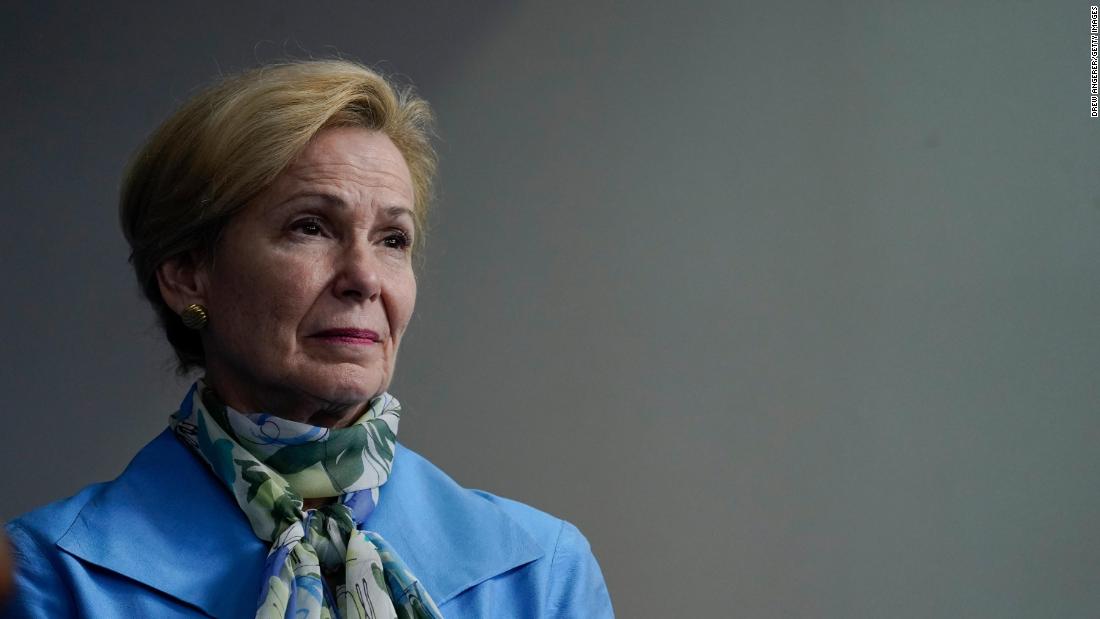Dr. Deborah Birx tells Dr. Sanjay Gupta that hundreds of thousands of people didn’t have to die if the US had done more sooner
Dr. Deborah Birx, who served as the White House coronavirus response coordinator under the Trump administration, reveals her chilling conclusion in a new CNN documentary that the number of coronavirus deaths could have been “decreased substantially” if cities and states across the country had aggressively applied the lessons of the first surge toward mitigation last spring, potentially preventing the surges that followed.
It is a bracing retrospective from one of the top doctors who was tasked with halting the pandemic, and it comes at a time when many grieving families are still trying to understand how one of the wealthiest and most powerful nations in the world was unable to prevent the loss of nearly 550,000 lives.
One area that is drawing new scrutiny is how long it took for former President Donald Trump and his Covid-19 advisers to declare a pause to slow the spread in March 2020 after the initial surge in coronavirus cases began — and how many lives could have been saved if all Americans had really adhered to the restrictions on gatherings and social distancing. In the new documentary, Birx gives Gupta her gut-wrenching answer when asked how much of an impact it would have made if the US had paused earlier and followed through with the safety measures that were proven to slow the spread.
“I look at it this way. The first time we have an excuse,” Birx says. “There were about a hundred thousand deaths that came from that original surge. All of the rest of them, in my mind, could have been mitigated or decreased substantially.”
“I remain deeply concerned about this trajectory. We have seen cases and hospital admissions move from historic declines to stagnations to increases,” Walensky said during the White House Covid-19 task force briefing Friday. “And we know from prior surges that if we don’t control things now, there is a real potential for the epidemic curve to soar again. Please, take this moment very seriously.”
Controversy over the origins of the virus
In another excerpt of the CNN documentary released Friday, Dr. Robert Redfield, the former director of the CDC, expressed fresh skepticism about China’s explanation that the initial Covid-19 cases emerged in a wet market in Wuhan. He told Gupta that he is convinced the pandemic began several months before the US was notified of the “mysterious cluster of pneumonia patients” in late December — raising the specter that the US and the world lost a precious period when they could have begun preparing for the outbreak to mitigate deaths.
“If I was to guess, this virus started transmitting somewhere in September, October in Wuhan,” Redfield told Gupta in a clip from the documentary. “That’s my own feelings. And only opinion. I’m allowed to have opinions now.”
On Friday, White House press secretary Jen Psaki said the Biden administration was reserving judgment on that question until the World Health Organization releases its final report on the origins of Covid-19. Peter Ben Embarek, who headed the organization’s Covid-19 origin investigation, told reporters during a separate briefing on Friday that the report is now complete and will be released to the public within a few days. Investigators visited the lab at the center of the controversy and Embarek told CNN in February that the team had determined the virus was much more widespread in Wuhan than originally thought back in December of 2019.
Fauci, the nation’s top infectious disease expert, seemed to downplay the possibility that Redfield’s explanation is correct during the White House Covid-19 briefing on Friday.
“Obviously, there are a number of theories,” said Fauci, director of the National Institute of Allergy and Infectious Diseases. “Dr. Redfield was mentioning that he was giving an opinion as to a possibility, but again, there are other alternatives — others, that most people hold by.”
A push toward 200 million shots in 100 days
About 49 million Americans are now fully vaccinated, and about 1 in 3 have received at least one dose. But White House officials are highlighting the fact that 71% of seniors have received one shot, because that age group accounts for roughly 80% of the Covid deaths up to this point.
With the increase in vaccine supply, Zients affirmed Friday there will be enough vaccine doses for every adult in the US by the end of May and said the three manufacturers who have received emergency use authorization for their vaccines in the US — Pfizer, Moderna and Johnson & Johnson — “are setting and hitting targets.”
“It’s clear there is a case for optimism, but there is not a case for relaxation,” Zients said. “This is not the time to let down our guard.”
![]()


